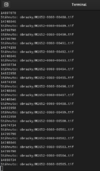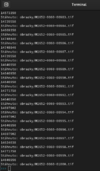Hi,
On the example above, there are 1000 files without any possibility to download everything at once.
I found a small free utility that lets you record macros based on mouse moves and clicks, that you can set up to repeat the number of times you need. You can also delay the repeat to allow the complete download of a file before downloading the next.
https://www.pymacrorecord.com/download
(I use the portable version)
But you have to let the computer alone during download.
If someone has a better solution, I am all ears...
Cheers,
S.
On the example above, there are 1000 files without any possibility to download everything at once.
I found a small free utility that lets you record macros based on mouse moves and clicks, that you can set up to repeat the number of times you need. You can also delay the repeat to allow the complete download of a file before downloading the next.
https://www.pymacrorecord.com/download
(I use the portable version)
But you have to let the computer alone during download.
If someone has a better solution, I am all ears...
Cheers,
S.


